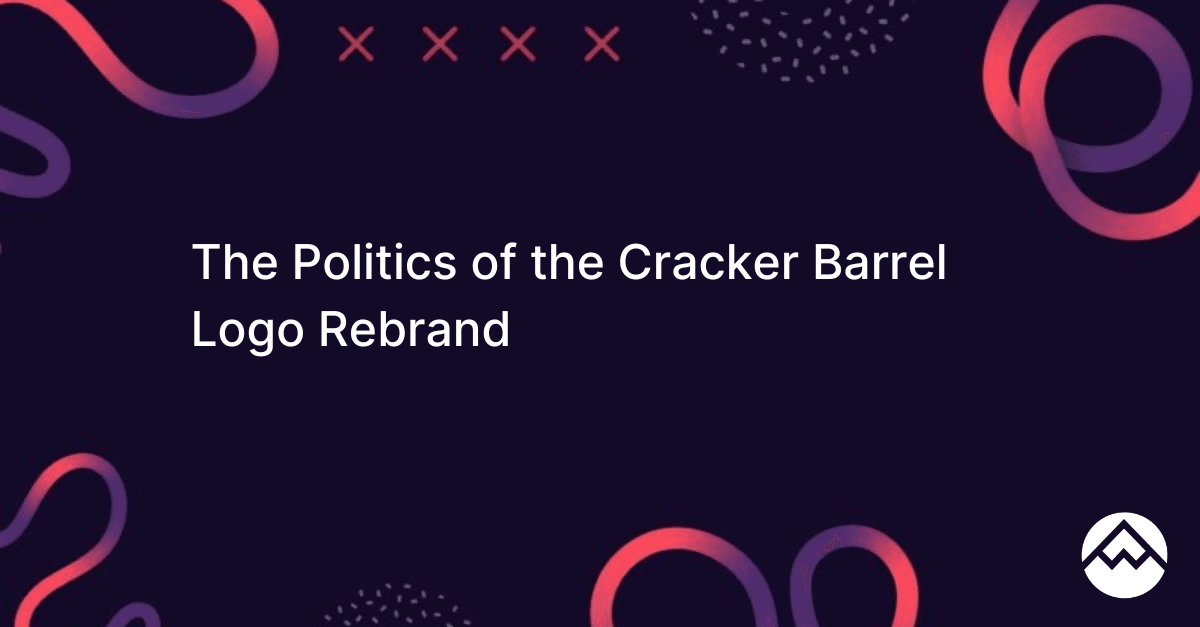
The Politics of the Cracker Barrel Logo Rebrand
On August 19, 2025, Cracker Barrel unveiled a bold new look as part of its “All the More” campaign. The company retired its iconic “Uncle Herschel” illustration, a man leaning on a barrel that had represented the brand since 1977, and replaced it with a stripped-down, text-only wordmark. Within days, the minimalist logo appeared on menus and inside restaurants.
This was intended to be one part of a sweeping modernization plan that also included brighter interiors, updated seating layouts, and expanded menu options such as margaritas and Nashville hot chicken. Instead, the rebrand quickly became a case study in how fast a design decision can spiral into a cultural and political storm.
How the Backlash Spread
PeakMetrics tracked the conversation across X (formerly Twitter) from August 18 to August 27, and the data shows how fast things escalated. During that window there were more than 472,000 posts that directly referenced Cracker Barrel’s logo or rebrand. Overall mentions of the brand on X surged past 1.58 million, compared to just 350 posts on August 18 before the change was announced.
The backlash was not only about aesthetics. It quickly became entangled in culture-war narratives. More than 423,000 posts framed the logo through terms such as woke, DEI, un-American, or anti-woke. Another 39,763 posts called for boycotts, and 16,855 posts connected the rebrand to the “Epstein files” conspiracy, peaking on August 22 with about 6,500 mentions.
The CEO herself also became a topic of conversation, with 138,427 posts referencing Julie Felss Masino and critics labeling her a “woke DEI CEO.”
Politics and Branding Collide
The controversy moved quickly into the political arena. Former President Donald Trump and his son blasted the company and urged a return to the old design. Trump said a reversal had the potential to be “a billion dollars’ worth of free publicity.” Conservative influencers such as Charlie Kirk shared the President’s sentiments, and Matt Walsh also joined the conversation. Some online also compared the logo change to other brand overhauls like the removal of Aunt Jemima.
Meanwhile, liberal voices including Governor Gavin Newsom’s office mocked the outrage. Their criticism was less about the politics and more about the logo itself, which many described as bland and forgettable. The debate was no longer about design—it had become a proxy for broader cultural battles over tradition and modernization.
Senator Chuck Schumer and others also took the opportunity to insert the Epstein File release into the conversation.
The Financial Fallout
The backlash had real consequences. Cracker Barrel’s stock fell more than 7%, wiping out nearly $100 million in market value in a matter of days. Shares briefly rose 4.5% after Trump’s intervention, but the episode underscored just how quickly reputational issues can spill into financial markets.
The Reversal
On August 26, after a week of mounting criticism and following Trump’s remarks, Cracker Barrel abandoned the new logo.
“We thank our guests for sharing your voices and love for Cracker Barrel. We said we would listen, and we have. Our new logo is going away and our ‘Old Timer’ will remain,” the company wrote.
Trump quickly applauded the move, congratulating the brand for listening to its fans.
A Larger Trend
This controversy is part of a broader pattern PeakMetrics has tracked across industries. When a brand’s core customer base leans in one direction politically, any move that feels out of step with those values is met with backlash. In this case, Cracker Barrel is a brand rooted in nostalgia and Americana. To many loyal customers the minimalist redesign felt like erasing tradition, which triggered a wave of outrage.
The same dynamic plays out in other sectors. A jeans ad campaign, a rollback of DEI commitments, or an advertising partnership can all spark political backlash if they appear to run counter to a brand’s perceived identity. The lesson is clear: companies must understand the values of their core audience before making large-scale changes.
Final Take
What began as a straightforward design update turned into a reputational crisis. With more than 1.5 million online mentions in a week, according to PeakMetrics data. Cracker Barrel’s logo became a cultural flashpoint. The company lost significant (and re-gained) market value, attracted attention from the highest levels of politics, and ultimately reversed course.
In today’s environment, every branding decision carries cultural weight. Leaders must anticipate the narratives their choices will trigger and be prepared for the political and reputational consequences. For Cracker Barrel, a new logo became a lightning rod. For other brands, it is a warning of what happens when modernization collides with tradition.
At PeakMetrics, we help organizations measure political lean to anticipate how changes will be received, and guide decisions before they escalate into crises. Learn more.
Sign up for our newsletter
Get the latest updates and publishings from the PeakMetrics investigations team.